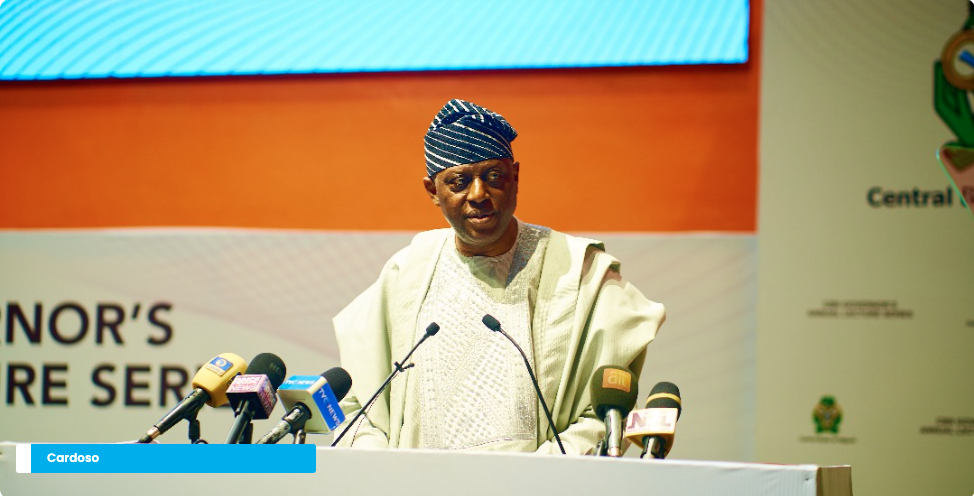
By Femi Odewunmi
On October 3, 2025, Nigeria witnessed something rare: a public institution modelling how Government ought to work. The Central Bank of Nigeria’s inaugural Governor’s Annual Lecture Series at Lagos Business School was not a ceremonial talk shop. It functioned as a live case study in transparency, accountability, and long-term thinking, values that have become scarce across the public sector.
At a time when successful reform depends on public trust, the CBN under Governor Olayemi Cardoso has become a reference point for rebuilding credibility. The lecture theme, Next-Generation Leadership in Monetary Policy and Nation-Building, distilled three disciplines every institution should adopt: radical transparency, intergenerational accountability, and unwavering focus on mandate.
Real transparency is costly. It invites scrutiny, narrows room for manoeuvre, and forces leaders to explain difficult decisions. Most Government agencies try to avoid that cost. The CBN has paid it.
Early in this administration, the Bank confronted an inherited foreign-exchange backlog approaching seven billion dollars. The politically convenient option was to defer or dispute obligations that pre-dated the current leadership. Instead, the Bank treated Nigeria’s word as non-negotiable and cleared verified claims. That choice signalled a doctrine: credibility first, even when the headline benefits are not immediate.
The outcomes are now visible. Reserves have strengthened beyond forty-two billion dollars. Capital inflows have returned. Credit views are improving. Investors respond to consistency and fact-based communication, and the CBN has offered both. Crucially, transparency has moved from rhetoric to an operating system. The Bank now publishes audited financial statements and verified reserve positions, and has opened the foreign-exchange market to greater daylight through electronic matching that reduces information asymmetry. After each Monetary Policy Committee meeting, the Bank subjects its decisions to live questioning. This is what institutional confidence looks like in practice: not perfectly popular, but consistently open.
The lecture series itself may become the Bank’s most enduring reform. Nigeria’s median age is about eighteen. By taking monetary policy out of closed rooms and into a hall full of students from Pan-Atlantic University, the University of Lagos, Lagos State University, and Yaba College of Technology, the CBN is investing in something more valuable than a single policy win: institutional memory. It is socialising the logic of stability. In a country that has often reversed the development sequence, the message was clear: stability before growth, credibility before capital, discipline before development. When a generation internalises that order, reform survives the news cycle.
None of this has been frictionless. Over two years, the Bank tightened policy by more than eight hundred basis points, recalibrated liquidity management, unified exchange-rate windows, and ended overdraft financing of government beyond statutory limits. Every move carried a political cost. The Bank stayed on mandate. The macro signals are encouraging: inflation off its peak and on a disinflation path toward single digits in the medium term, real GDP growth at 4.2 per cent in the second quarter, and a naira that is steadily finding its footing. More telling than any speech, global investors who once waited on the sidelines are re-engaging.
There is also a forward look that matters. The CBN’s internal push toward digitisation and the deliberate use of AI for oversight are not branding flourishes. They are governance choices. Paperless approvals, data-driven supervision, and market infrastructure that publishes what used to be privileged information all compress discretion and expand trust. In a system where opportunity has too often depended on proximity, open data is an equaliser.
What distinguishes the current Central Bank leadership is how seamlessly its philosophy aligns with the national reform mood, a shared insistence on fiscal prudence, institutional discipline, and youth-centred renewal. CBN’s outreach to young leaders flows from the same conviction: that rebuilding Nigeria’s credibility must begin with restoring its confidence. The Bank’s technocratic tone complements the larger vision of a government determined to rebuild faith in the state through results, not rhetoric.
The deeper lesson for the public sector is about posture. The strongest institutions do not over-promise. They disclose, they deliver, and they let evidence carry the argument. Transparency is not public relations; it is an operating discipline that raises performance. Youth engagement is not a ceremony; it is a national capacity investment that compounds over decades.
Other agencies can adapt the model. Imagine a Ministry of Health series that opens the books on service financing and outcomes, a Nigerian Ports forum that publishes turnaround times and tackles logistics bottlenecks in public view, or a Civil Service dialogue that reports on delivery targets and missed milestones with equal candour. Institutions that speak, teach, publish and listen become institutions that last.
If there is a single takeaway from the CBN’s example, it is this: public trust is not a communications asset to be managed; it is an accountability contract to be earned. Nigeria’s institutions should treat transparent communication as a duty, not a tactic. They should design policy forthrightly, with the trade-offs made explicit before implementation rather than defended after the fact. And they should commit to accountability in evaluation by publishing targets, measuring against them, and correcting courses in the open. That is how confidence accumulates. That is how reform endures. And that is how the government regains the most valuable currency in a volatile world, the informed trust of its citizens.
——
Femi Odewunmi is Group CEO of Creative Intelligence Group, a strategic communications and policy advisory firm advising public institutions on policy communications and credibility-building across governance and economic policy.
Ready to navigate today's challenges with a powerful ally by your side? Connect with us to chart a course for success
Schedule A Consult